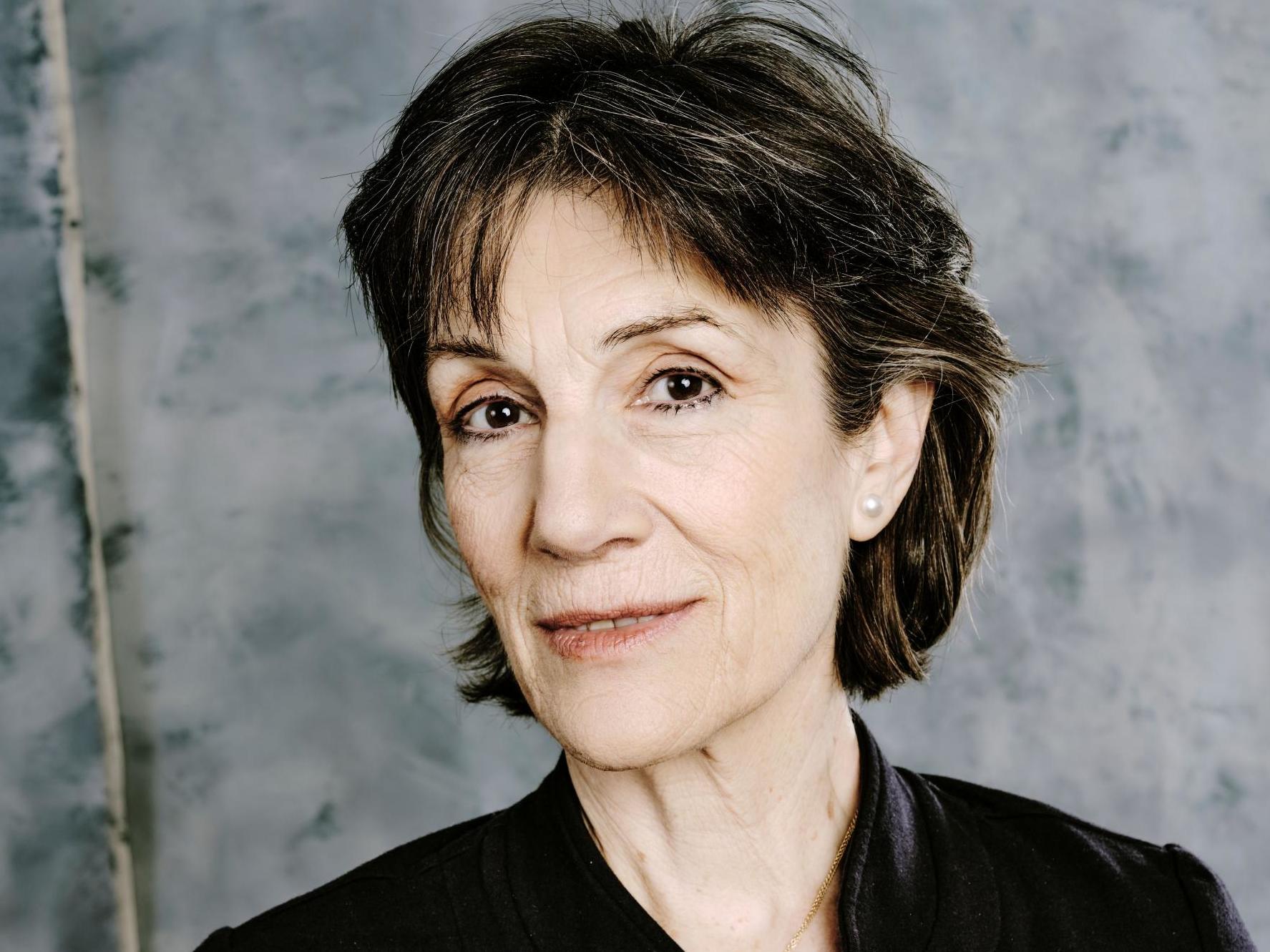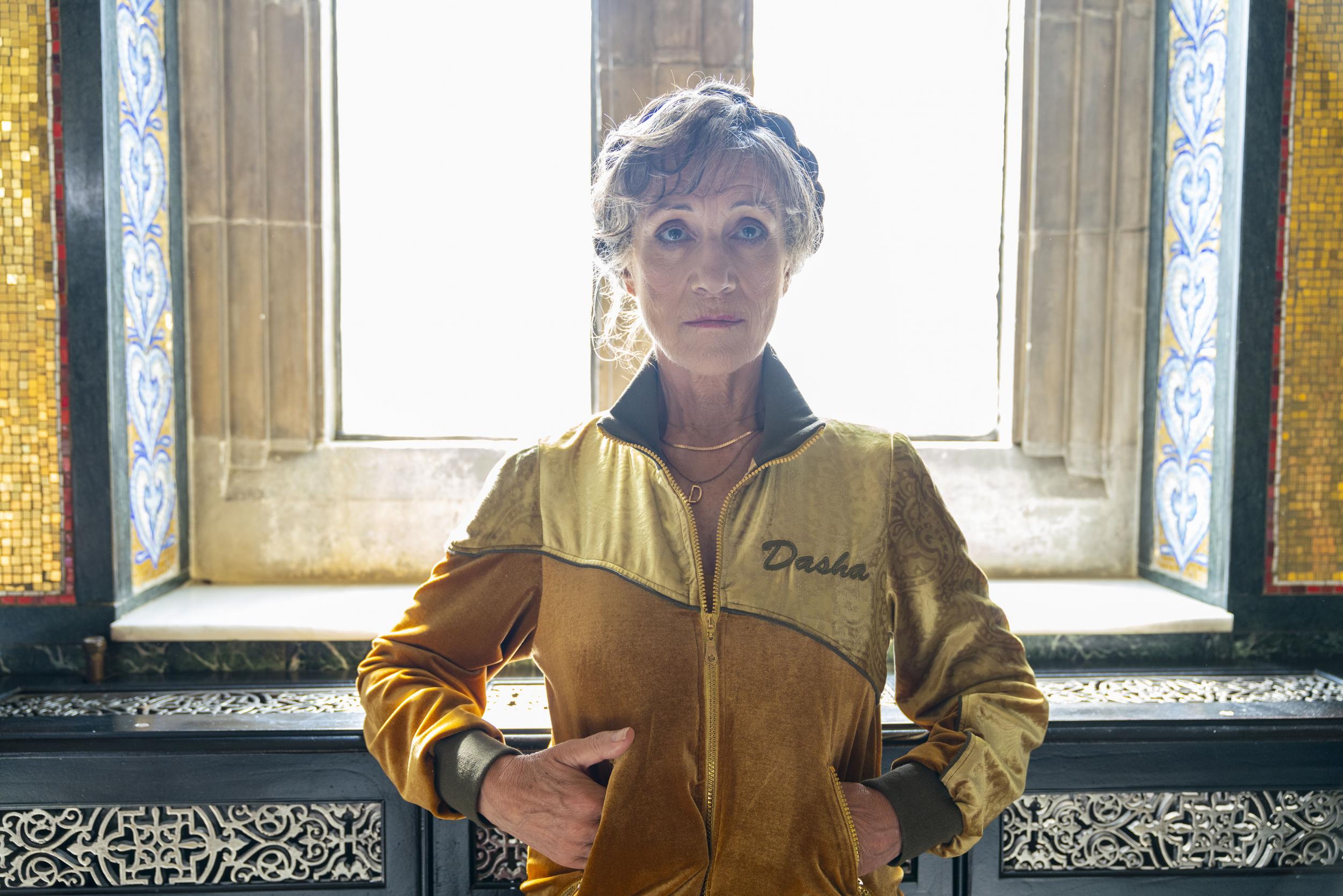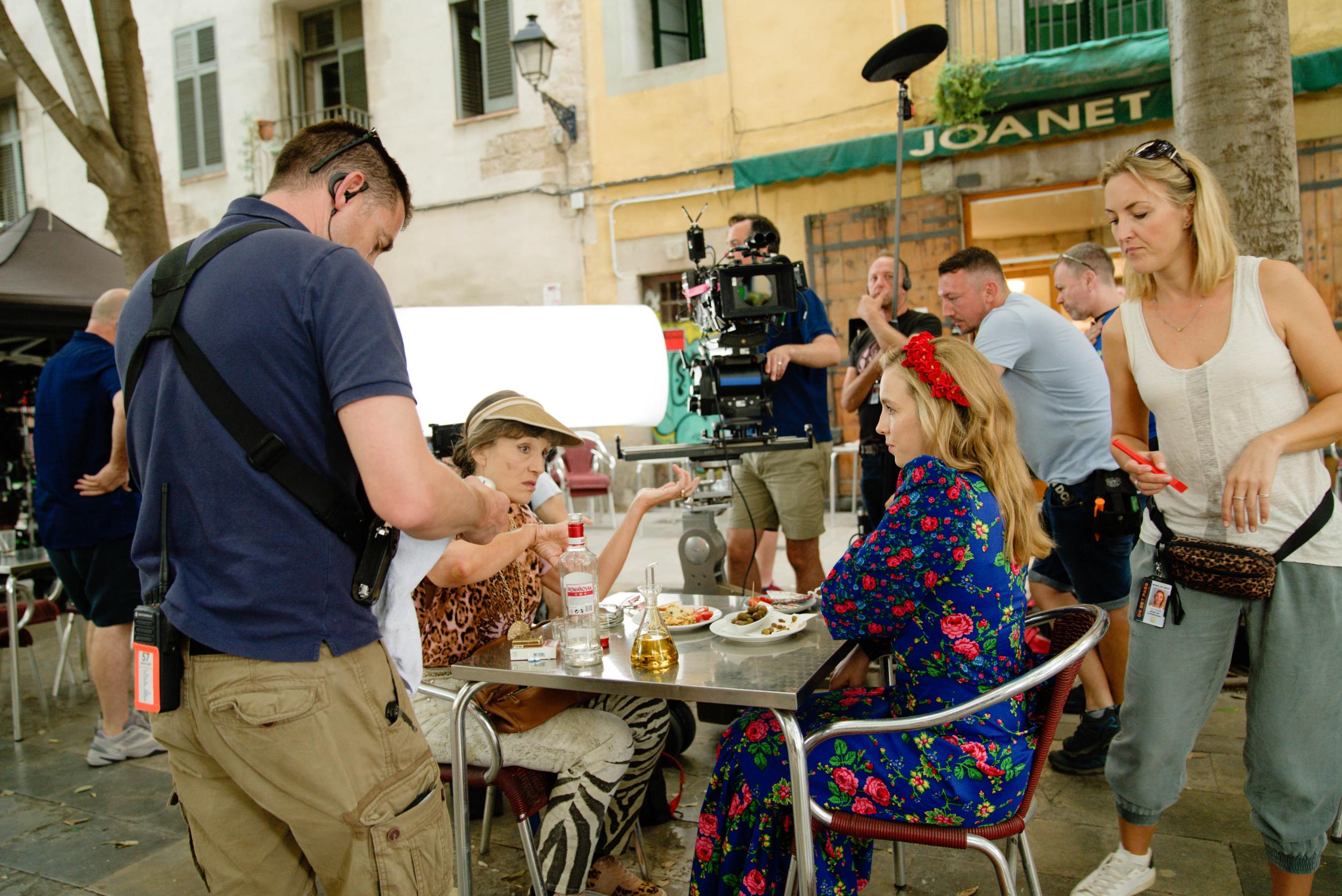Killing Eve’s Harriet Walter: ‘Male writers and producers have their fantasy of what an awful woman is’
The actor has joined Phoebe Waller-Bridge’s acclaimed spy thriller for its third season. She talks to Alexandra Pollard about the joy of not wearing a corset, the limitations of Shakespeare’s heroines and why she thinks people should think carefully before changing their pronouns


Five minutes before speaking to Harriet Walter, I watched her stab a man through the neck with a rusty pitchfork. “I can’t wait to see that,” says the 69-year-old, whose Russian gymnast-slash-assassin Dasha is responsible for the most brutal moment of Killing Eve’s new season. “It was so liberating after I’d played various people in corsets,” she adds with a chuckle, “that I might have gone too far the other way.”
Even buttoned up in period dramas such as Belgravia, The Crown and Downton Abbey, Walter has long made it her mission to “play older women who haven’t frozen” – poised and solemn, yes, but never stuffy. In Phoebe Waller-Bridge’s stylish spy thriller, though, she really lets loose, armed with a thick Russian accent and leopard-print wardrobe. Starring Sandra Oh and Jodie Comer as as an MI5 agent (Eve) and psychopathic killer (Villanelle) who just can't seem to stay from each other, the show injected new life into a macho and increasingly musty genre when it arrived on the scene in 2018.
There were Emmys. Five-star raves. Everything was pored over, from Villanelle’s indiscriminate sexual appetite to her cheeky nihilism to that frilly pink dress. Waller-Bridge handed over writing duties to Emerald Fennell for the second season; Suzanne Heathcote has taken the reins for the third, which zips along with that same delicate balance of silliness and substance, glamour and gore. It is still a tube of lipstick with a razor blade hidden inside.
There are a few new arrivals. Gemma Whelan is Carolyn’s formerly estranged daughter. Steve Pemberton is an MI6 jobsworth. And Walter is Dasha, Villanelle’s former trainer, back to help her shape up a new generation of murderous recruits. The kind of woman who dumps a baby in a bin because it’s annoying her, Dasha gives Villanelle a run for her money in the psychopath department. “I’d describe her as a very deeply disturbed, competitive fanatic, who has been at the top of her game but is now clinging onto her past record,” says Walter. Like most of the world, she’s at home under lockdown, so we’re speaking over the phone, Walter between bites of salad and smoked fish – “made yesterday but still going strong”. The English actor is as articulate as you’d expect from someone so au fait with the words of Shakespeare – peppering the conversation with words like “thereby”, “eschew” and “braggadocio” – though I suspect she’s a little scattier than she seems on-screen. She’s finding aspects of lockdown “quite challenging”, she says, because she can’t seem to figure out a timetable. “I know that’s the way people get through things: ‘Yoga in the morning, write my novel in the afternoon’,” she says. “I just can’t organise my life like that. So I’m sort of face to face with my own chaos.”
As character flaws go, it’s not quite up there with Dasha’s – but Walter never condemns the characters she plays, not even someone as despicable as that. “I’m not very interested in just judging people as monsters or evil meanies,” she says. “Drama deals with deviations or extremes or naked emotions, not covered-up, polite emotions. I think all human behaviour comes from the same source, and we’re all capable of all of it.”

Take Caroline in Succession, the feted HBO drama about the conniving members of a media dynasty, headed up by the self-made magnate Logan Roy (Brian Cox). Roy’s acerbic ex-wife and the mother of his children, Caroline is the type of person who asks guests at her daughter’s wedding how long they think the marriage will last. “I feel we haven’t explored her really,” says Walter, who’s in three episodes of the drama and steals every scene. “We just see her being amusingly waspish and a really evasive mother. But there are reasons for that. I’m not saying she’s squeaky clean, but she’s part of that environment and has grown up with those influences, and being married to bloody Logan Roy, I mean, how do you get out of that one without being a bit tough?” It sounds like she feels protective of her. “I do feel protective about Caroline,” she says, “because I don’t think anybody knows her. In order to play her, I’ve given myself various interior stories – not whitewashing her, but finding a reason for how she behaves. And nobody but me knows those things, so of course I feel quite protective of her.”
In any case, Walter resents the expectation that women should be likeable. “It’s so deeply ingrained in our behaviour to please people and be personable,” she says, “but what’s great about things like Killing Eve and Succession is that you’re not really behaving for men, you’re behaving for yourself. I have in the past resisted a male take on female motivation. Male producers and writers have objectified a woman as their fantasy of what an awful woman is – a terrible mother-in-law or a wicked witch. But you’re playing the part and you’re inside their head and you find that doesn’t square with how you’re feeling about the character. So that can be quite painful.”

Does she notice a difference working with female writers and directors? “I think I do, because a lot of the young women I’ve been working with have had to fight quite hard to get where they’ve got, and they know that being nice and sweet all the time doesn’t actually get you where you need to be. If you have talent and something you want to get out there, most of the women I’ve worked with have learnt they have to be a bit tough.”
Earlier in her career, after turning down a place at Oxford only to be turned down by five drama schools, Walter made a name for herself on the stage as one of the country’s most revered Shakespearian actors. But she sometimes had to work hard to find the toughness in those roles, poring over the text to mine depth that was usually overlooked. When she approached late middle age, she realised that she had run out of Shakespeare heroines to play. So she turned to the men, playing Brutus in Julius Caesar, the eponymous king in Henry IV, and Prospero in The Tempest. In her 2016 book, Brutus and Other Heroines, she notes that if you apply the Bechdel test to Shakespeare’s plays, there is just one scene (in Henry V) where two women talk to each other about something besides a man. “I cannot imagine a world without you,” she writes, addressing the Bard himself. “I just wish you had put more women at the centre of your world/stage... I would love you to come back and do some rewrites.”

Watch Apple TV+ free for 7 day
New subscribers only. £9.99/mo. after free trial. Plan auto-renews until cancelled.
ADVERTISEMENT. If you sign up to this service we will earn commission. This revenue helps to fund journalism across The Independent.

Watch Apple TV+ free for 7 day
New subscribers only. £9.99/mo. after free trial. Plan auto-renews until cancelled.
ADVERTISEMENT. If you sign up to this service we will earn commission. This revenue helps to fund journalism across The Independent.
“All the work I’ve done in the classical theatre has been to try and bring out the fact that women probably haven’t changed that much – that just because they had to behave in a certain way, it didn’t mean they were from a different planet,” she says now. “We’re the same people, and we’re constrained by our cultural context, we obey the laws of our society, but that doesn’t mean that inside, you’re not thinking, ‘God, I wish I could take this corset off, God, I wish I could run my husband’s business, I wish I could go for a run and climb up a tree.’ Women were so much more capable than they were culturally allowed to show.”
She credits Germaine Greer’s The Female Eunuch, which she first read in the Seventies, with fuelling her feminism, and allowing her to not feel weird “for not quite conforming to people’s notions of femininity”. How did she not conform? “Funny things, stupid things,” she says. “I suppose I was driven by an ambition. I didn’t want to get married and have children at that point.” She was with her first partner, the actor Peter Blythe, until his death in 2004, but they never married. In 2011, she married the American actor Guy Paul. “I never quite conformed in terms of being decorous and dainty,” she continues. “I was always more interested in getting somewhere fast than wearing high heels that would stop me running for a bus. Just things like that. Quite trivial things, but reading something like The Female Eunuch really spun my head round and rearranged everything, and I was at exactly the age when you were trying to do that anyway.”

I mention that other actors I’ve spoken to have had a similarly complicated relationship with their own femininity – that they found themselves disowning it for a while, before reclaiming it on their own terms. “I mean, I didn’t reject all femininity, I never went through that,” says Walter, “but I definitely treated it – and still do treat these things – as a choice. I believe in following what you naturally feel, not imposing something on yourself. We should really celebrate the fact that there’s much more recognition of the variations of gender identity now than there ever has been.” To Walter, though, it is no more necessary to reject femininity than it is to conform to it. “If you say, ‘I definitely don’t feel I’m in the right body,’ that’s one thing, but if you don’t feel you’re in the right culture, that’s a different thing. You can change that. If you think, ‘God, I don’t fit into what people tell me I should be as a woman,’ now come on, nobody’s telling you that you have to be that any more. You’re not as repressed as your grandmothers and great-grandmothers, make use of the fact that you can actually pioneer a new way. It’s up to us to change what those prescriptions or expectations are.”
There is, I agree, more room to explore and experiment with gender identity now. “Exactly, and I would also probably be controversial in saying, you don’t have to choose a pronoun,” she says. “You could still say you’re ‘she’, if the world accepts that ‘she’ means a million different things. If we open the box to include any number of different versions of ‘she’, then you don’t need to change your pronoun. I just think it’s quite hard for other people outside of you to understand what you want and maybe you make it easier by just saying, ‘OK, I’m a woman but I’m not defined by that. My whole personality and life is not defined by the fact that I have been assigned a biological gender.’” She knows she’s getting into difficult territory. “I mean, it’s a very fluid argument and it will go on for a while and I think it’s very healthy that it’s happening. I suppose I’m putting in a plea for understanding the whole spectrum and not getting aggressive about it, because a lot of people don’t quite understand what’s going on and they shouldn’t feel frightened to talk about it.”

That might be true, I say, but often people who don’t understand are also unwilling to listen or learn. “Yes, yes, so there’s aggression on both sides,” she says. “Or defensiveness on both sides. I can understand that, and I hope that we start listening and talking better.”
The publicist tells me I have one question left, so I ask Walter to reflect on her career. Is she glad – having recently worked with someone like Jodie Comer, whose star ascended at breakneck speed – that hers had a more gradual trajectory? “Yes I am,” she says. “I mean, I don’t know how much control one has over the way one’s career goes – it’s a kind of collision of events around you. I think Jodie’s dealing with it brilliantly. I’ve got huge admiration for her. And other people I’ve seen that happen to – like Emily Blunt, Kate Winslet, Saoirse Ronan, I worked with all of them when they were really young, and I think they’re just tremendous the way they’ve kept their feet on the ground and not bought into some of the sillier bits of fame. There are limits if you don’t get super famous. If you’re super famous, you can do many things that I can’t do. But at the same time, I don’t think I’d swap it.” She laughs. “I have no regrets.”
Killing Eve season three is airing on Sundays at 9.15pm on BBC1
Join our commenting forum
Join thought-provoking conversations, follow other Independent readers and see their replies
Comments
Bookmark popover
Removed from bookmarks